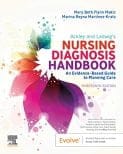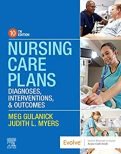

Constipation is a common digestive issue that can cause discomfort and pain for patients. Nursing diagnosis and care plans for constipation are essential to improve patient outcomes and provide effective care.
Nurses need to have a thorough understanding of the nursing diagnosis for constipation and develop appropriate interventions to manage the patient’s symptoms.
Constipation is a common gastrointestinal disorder that affects people of all ages. It is a medical condition that is characterized by infrequent bowel movements, difficulty passing stools, or both. Constipation is diagnosed when a person has less than three bowel movements in a week.
Symptoms of constipation include bloating, abdominal discomfort, straining during bowel movements, and the sensation of incomplete evacuation. In some cases, constipation can lead to fecal impaction, which is a blockage of the intestine by hardened stool.
There are many factors that can contribute to constipation, including age, diet, lack of physical activity, certain medications, and underlying medical conditions. For example, older adults are more prone to constipation due to a decrease in muscle tone and mobility in the digestive tract.
Constipation can be a chronic condition, but it can also be a temporary problem that can be relieved with lifestyle changes, such as increasing fiber intake, drinking more water, and engaging in regular physical activity. However, in some cases, medical intervention may be necessary to manage constipation.
In conclusion, constipation is a common medical condition that can affect people of all ages. It is characterized by infrequent bowel movements, difficulty passing stools, or both. The symptoms of constipation can be uncomfortable and even painful. But, with proper diagnosis and management, constipation can be effectively treated and prevented.
Constipation can be caused by various factors that affect bowel function. These factors may include a low-fiber diet, inadequate water intake, a sedentary lifestyle, certain medications, and medical conditions.
A low-fiber diet is a common cause of constipation. Fiber adds bulk to the stool, making it easier to pass through the intestines. Inadequate water intake can also contribute to constipation because it can cause the stool to become hard and difficult to pass. A sedentary lifestyle can also slow down the digestive system, leading to constipation.
Certain medications can cause constipation as a side effect. Opioids and anticholinergics are examples of medications that can slow down the digestive system and cause constipation. Antidepressants can also cause constipation in some people.
Stress can affect the digestive system and cause constipation. When a person is stressed, the body releases hormones that can slow down the digestive system. This can lead to constipation.
Neurological problems such as multiple sclerosis can affect the nerves that control the digestive system. This can lead to constipation.
Medical conditions such as abdominal distention, diverticulitis, and anal fissures can cause constipation. Older adults are also more likely to experience constipation due to age-related changes in the digestive system. Ileus, a condition in which the intestines stop working, can also cause constipation.
In conclusion, constipation can be caused by various factors that affect bowel function. A low-fiber diet, inadequate water intake, a sedentary lifestyle, certain medications, and medical conditions are some of the common causes of constipation.
Constipation is a common gastrointestinal problem that affects individuals of all ages. The signs and symptoms of constipation may vary depending on the severity of the condition. Here are some of the common signs and symptoms of constipation:
Individuals experiencing these symptoms should seek medical attention immediately. In some cases, constipation may be a symptom of an underlying medical condition, such as bowel obstruction, colon cancer, or neurological disorders.
It is important to note that the frequency of bowel movements may vary from person to person. Some people may have bowel movements once or twice a day, while others may have them every other day or even less frequently. However, if an individual experiences a significant change in their bowel habits, such as a sudden decrease in frequency or difficulty in passing stools, they should consult a medical professional.
In addition, certain lifestyle factors may contribute to constipation, such as a low-fiber diet, inadequate fluid intake, lack of physical activity, and certain medications. Therefore, a thorough evaluation of an individual’s diet, exercise habits, and medication use is essential in identifying the underlying cause of constipation.
Constipation can be treated using a combination of lifestyle changes, medication, and other interventions. Treatment aims to relieve symptoms, improve bowel movements, and prevent constipation from recurring.
There are several specific medications used to treat constipation, including:
It is important to note that medication should only be used under the guidance of a healthcare provider, as some medications can have side effects and interact with other medications.
It is essential to monitor patients with constipation for any signs of complications and take appropriate measures to prevent them. Healthcare providers should educate patients on the importance of maintaining regular bowel movements and adopting healthy lifestyle habits to prevent constipation and its complications.
Preventing constipation is essential to ensure a healthy bowel movement. Nurses can play a crucial role in educating patients on how to prevent constipation. Here are some ways to prevent constipation:
A healthy diet that is rich in fiber can prevent constipation. Patients should consume a diet that is high in fruits, vegetables, whole grains, and legumes. These foods are rich in fiber and can promote bowel movements. Patients should also avoid foods that can cause constipation, such as processed foods, cheese, and red meat.
Drinking plenty of water can help prevent constipation. Patients should aim to drink at least eight glasses of water per day. Dehydration can cause constipation, so it is essential to stay hydrated.
Regular physical activity can promote bowel movements. Patients should aim to exercise for at least 30 minutes per day. Exercise can help stimulate the muscles in the intestines, which can promote bowel movements.
Using a stool chart can help patients monitor their bowel movements. The stool chart helps patients identify the type of stool they are producing and can help them identify any changes in their bowel movements. Patients should aim to produce stool that is type 3 or type 4 on the stool chart.
Certain medications can cause constipation. Patients should talk to their healthcare provider about any medications that may be causing constipation. Healthcare providers can recommend alternative medications or prescribe medications to help promote bowel movements.
Preventing constipation is essential to ensure a healthy bowel movement. Nurses can play a crucial role in educating patients on how to prevent constipation. Patients should consume a diet that is high in fiber, drink plenty of water, exercise regularly, use a stool chart to monitor their bowel movements, and talk to their healthcare provider about any medications that may be causing constipation.
When a patient presents with symptoms of constipation, a thorough nursing assessment is crucial to identify the underlying cause and develop an appropriate care plan. The assessment should include a detailed medical history, physical exam, and digital rectal exam (DRE) to evaluate the patient’s bowel function and identify any structural abnormalities.
During the nursing assessment, the nurse should ask the patient about their bowel habits, including frequency, amount, and consistency of stool. The nurse should also ask about any medications the patient is taking that may contribute to constipation. Certain medications, such as opioids, anticholinergics, and calcium channel blockers, are known to cause constipation.
The physical exam should include an abdominal assessment to evaluate for distention, tenderness, and palpable masses. The nurse should also assess for incomplete evacuation, which is a common symptom of constipation. Incomplete evacuation can be identified by the presence of hard stool in the rectum or by the patient’s report of a feeling of incomplete bowel movement.
A DRE may be performed to assess for rectal prolapse, hemorrhoids, or other structural abnormalities that may contribute to constipation. The nurse should also assess for signs and symptoms of irritable bowel syndrome (IBS), which is a common cause of chronic constipation.
Additional diagnostic tests may be ordered based on the patient’s symptoms and medical history. Criteria for the diagnosis of constipation include fewer than three bowel movements per week, straining during bowel movements, hard or lumpy stool, and a feeling of incomplete evacuation.
Defecography and MRI defecography may be used to evaluate for structural abnormalities or pelvic floor dysfunction that may contribute to constipation. The nursing assessment should be comprehensive and person-centered to identify the underlying cause of constipation and develop an appropriate care plan.
Nursing diagnosis is a critical aspect of constipation management. It involves an assessment of the patient’s condition, identification of the problem, and formulation of a nursing care plan. The nursing diagnosis for constipation includes several factors that contribute to the condition.
Based on the factors mentioned above, you can develop a nursing care plan for constipation. Some nursing diagnoses for constipation may include:
In conclusion, nursing diagnosis is an essential aspect of constipation management. By identifying the contributing factors and implementing appropriate nursing interventions, nurses can help patients manage their constipation and improve their quality of life.
When developing nursing care plans for constipation, setting goals and expected outcomes is crucial. Common goals include improving bowel function and relieving associated symptoms like abdominal pain and bloating. Within 4 hours of nursing intervention and treatment, the patient will identify measures that prevent or treat constipation.
It is important to regularly reassess the patient’s condition and adjust the care plan as needed. By setting clear goals and expected outcomes and implementing appropriate nursing interventions, healthcare providers can effectively manage constipation and improve the patient’s quality of life.
Nursing interventions for constipation aim to improve bowel movement and prevent complications. These interventions can include lifestyle changes, medication administration, and enemas. Here are some common nursing interventions and their rationales:
In conclusion, nursing interventions for constipation aim to improve bowel movement and prevent complications. These interventions can include lifestyle changes, medication administration, and enemas. Nurses should work with the physician and other healthcare providers to develop a personalized plan of care for the patient.
These are the nursing books and resources that we recommend.
NurseStudy.net is a participant in the Amazon Services LLC Associates Program. Included below are affiliate links from Amazon at no additional cost from you. We may earn a small commission from your purchase. Please see our Privacy Policy

This is an excellent reference for nurses and nursing students. While it is a great resource for writing nursing care plans and nursing diagnoses, it also helps guide the nurse to match the nursing diagnosis to the patient assessment and diagnosis.
This handbook has been updated with NANDA-I approved Nursing Diagnoses that incorporates NOC and NIC taxonomies and evidenced based nursing interventions and much more.

All introductory chapters in this updated version of a ground-breaking text have been completely rewritten to give nurses the knowledge they require to appreciate assessment, its relationship to diagnosis and clinical reasoning, and the goal and use of taxonomic organization at the bedside.

It contains more than 200 care plans that adhere to the newest evidence-based recommendations.
Additionally, it distinguishes between nursing and collaborative approaches and highlights QSEN competencies.
Ackley, B. J., Ladwig, G. B., Makic, M. B., Martinez-Kratz, M. R., & Zanotti, M. (2020). Nursing diagnoses handbook: An evidence-based guide to planning care. St. Louis, MO: Elsevier.
Bharucha AE, Lacy BE. Mechanisms, Evaluation, and Management of Chronic Constipation. Gastroenterology. 2020 Apr;158(5):1232-1249.e3. doi: 10.1053/j.gastro.2019.12.034. Epub 2020 Jan 13. PMID: 31945360; PMCID: PMC7573977.
Gulanick, M., & Myers, J. L. (2022). Nursing care plans: Diagnoses, interventions, & outcomes. St. Louis, MO: Elsevier.
Ignatavicius, D. D., Workman, M. L., Rebar, C. R., & Heimgartner, N. M. (2018). Medical-surgical nursing: Concepts for interprofessional collaborative care. St. Louis, MO: Elsevier.
Larkin PJ,Cherny NI,La Carpia D,Guglielmo M,Ostgathe C,Scotté F,Ripamonti CI,ESMO Guidelines Committee., Diagnosis, assessment and management of constipation in advanced cancer: ESMO Clinical Practice Guidelines. Annals of oncology : official journal of the European Society for Medical Oncology. 2018 Oct 1
Osuafor CN, Enduluri SL, Travers E, Bennett AM, Deveney E, Ali S, McCarthy F, Fan CW. Preventing and managing constipation in older inpatients. Int J Health Care Qual Assur. 2018 Jun 11;31(5):415-419. doi: 10.1108/IJHCQA-05-2017-0082. PMID: 29865964.
Silvestri, L. A. (2020). Saunders comprehensive review for the NCLEX-RN examination. St. Louis, MO: Elsevier.
Włodarczyk J, Waśniewska A, Fichna J, Dziki A, Dziki Ł, Włodarczyk M. Current Overview on Clinical Management of Chronic Constipation. Journal of Clinical Medicine. 2021; 10(8):1738. https://doi.org/10.3390/jcm10081738
Please follow your facilities guidelines and policies and procedures.
The medical information on this site is provided as an information resource only and is not to be used or relied on for any diagnostic or treatment purposes.
This information is not intended to be nursing education and should not be used as a substitute for professional diagnosis and treatment.
Anna Curran. RN-BC, BSN, PHN, CMSRN I am a Critical Care ER nurse. I have been in this field for over 30 years. I also began teaching BSN and LVN students and found that by writing additional study guides helped their knowledge base, especially when it was time to take the NCLEX examinations.